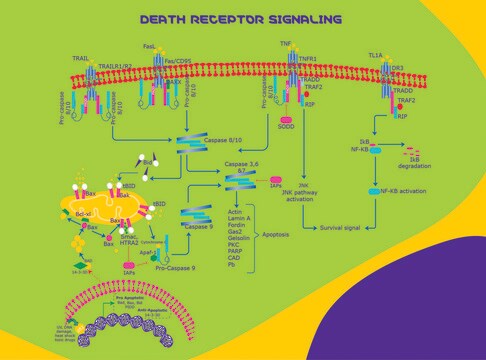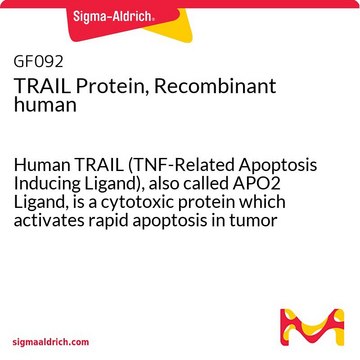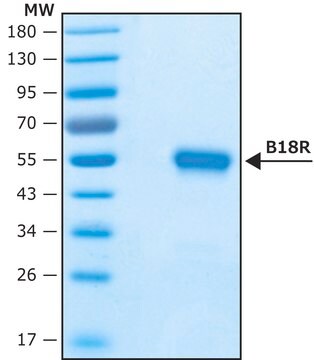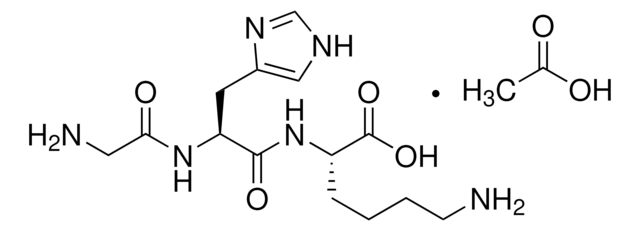おすすめの製品
由来生物
rat
リコンビナント
expressed in E. coli
アッセイ
≥95% (SDS-PAGE)
フォーム
lyophilized powder
分子量
20 kDa
包装
pkg of 10 μg
pkg of 50 μg
不純物
<1 EU/μg endotoxin (LAL test)
UniProtアクセッション番号
輸送温度
wet ice
保管温度
−20°C
遺伝子情報
mouse ... TRAIL(22035)
詳細
TRAIL is a cytotoxic protein, which activates rapid apoptosis in tumor cells, but not in normal cells. TRAIL induced apoptosis is achieved through binding to two death-signaling receptors, DR4 and DR5. These receptors belong to the TNFR superfamily of transmembrane proteins and contain a cytoplasmic “death domain”, which activates the cell′s apoptotic machinery. Recombinant murine TRAIL is a 174 amino acid polypeptide (20.0 kDa), consisting of the TNF homologous portion of the extracellular domain of the full length TRAIL protein.
物理的形状
Sterile filtered through a 0.2 micron filter. Lyophilized from 10 mM Sodium Phosphate, pH 7.0.
再構成
Centrifuge the vial prior to opening. Reconstitute in water to a concentration of 0.1-1.0 mg/mL. Do not vortex. This solution can be stored at 2-8°C for up to 1 week. For extended storage, it is recommended to further dilute in a buffer containing a carrier protein (example 0.1% BSA) and store in working aliquots at -20°C to -80°C.
保管分類コード
11 - Combustible Solids
WGK
WGK 1
引火点(°F)
Not applicable
引火点(℃)
Not applicable
適用法令
試験研究用途を考慮した関連法令を主に挙げております。化学物質以外については、一部の情報のみ提供しています。 製品を安全かつ合法的に使用することは、使用者の義務です。最新情報により修正される場合があります。WEBの反映には時間を要することがあるため、適宜SDSをご参照ください。
Jan Code
SRP6238-50UG:
SRP6238-10UG:
最新バージョンのいずれかを選択してください:
Katrin Högner et al.
PLoS pathogens, 9(2), e1003188-e1003188 (2013-03-08)
Influenza viruses (IV) cause pneumonia in humans with progression to lung failure and fatal outcome. Dysregulated release of cytokines including type I interferons (IFNs) has been attributed a crucial role in immune-mediated pulmonary injury during severe IV infection. Using ex
Lenka V Tamayo et al.
Biometals : an international journal on the role of metal ions in biology, biochemistry, and medicine, 29(1), 39-52 (2015-11-20)
Copper(II) complexes [Cu(H2O)2 (L1)(phen)](ClO4) (1) and [Cu(H2O)(L2)(phen)](ClO4) (2) (HL1 = naringenin; HL2 = hesperetin) were obtained, in which an anionic flavonoid ligand is attached to the metal center along with 1,10-phenanthroline (phen) as co-ligand. Complexes (1) and (2) were assayed
Kathrin Steinwede et al.
The Journal of experimental medicine, 209(11), 1937-1952 (2012-10-17)
Apoptotic death of alveolar macrophages observed during lung infection with Streptococcus pneumoniae is thought to limit overwhelming lung inflammation in response to bacterial challenge. However, the underlying apoptotic death mechanism has not been defined. Here, we examined the role of
ライフサイエンス、有機合成、材料科学、クロマトグラフィー、分析など、あらゆる分野の研究に経験のあるメンバーがおります。.
製品に関するお問い合わせはこちら(テクニカルサービス)







